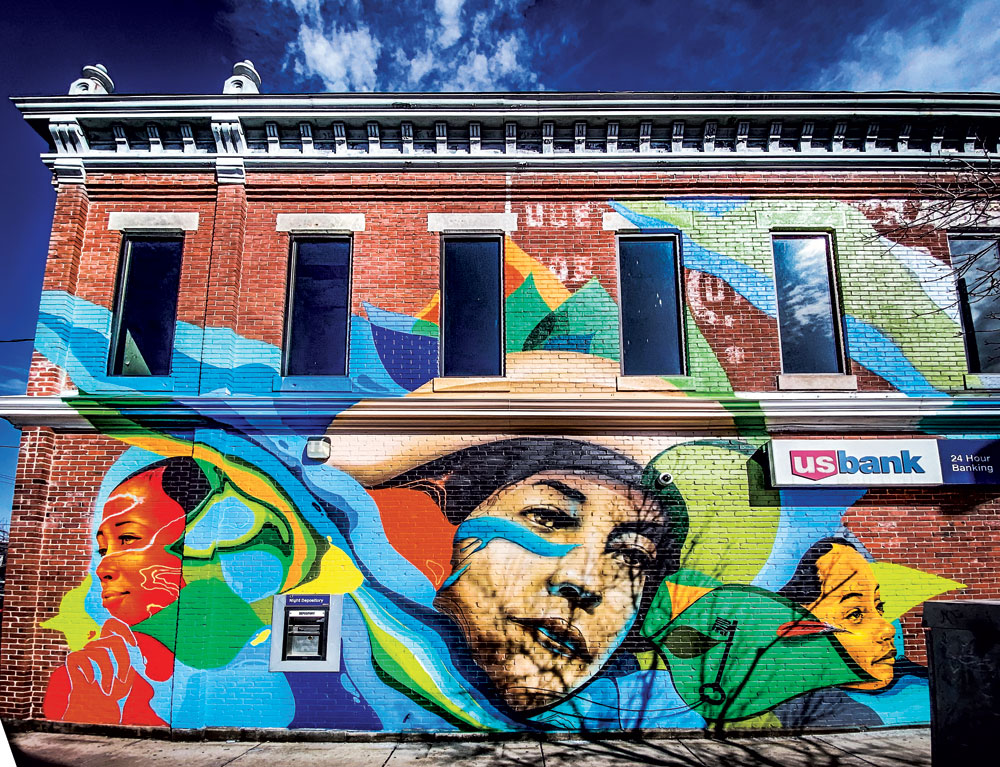
Dr. Ford lived and worked in the Five Points neighborhood for decades, providing vital medical services across a diverse community. Max Sansing’s new mural at 2701 Welton St. that honors Dr. Ford was the site of a Feb. 21 dedication.
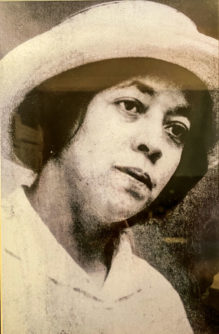
This photo of Dr. Justina Ford, Colorado’s first female African-American doctor, is displayed in the Black American West Museum. It is the image that was used for the new mural honoring her.
At 81 years of age, Colorado’s first African-American woman doctor, Justina Warren Ford, was still practicing medicine in Denver. In fact, she worked until two weeks before her death on Oct. 14, 1952, leading the Colorado Statesman to declare a few days later “Death Claims Prominent Woman Doctor.”
Ford could speak between 8 and 11 languages and dialects and delivered over 7,000 babies, according to Sylvia Lambe, who serves on the advisory board of the Black American West Museum and Heritage Center. But despite completing all licensing requirements and having the respect and trust of her many patients, she was constricted by the racism and sexism of local, state, and national medical societies. They excluded her from their ranks until two years before her death. It was January 1950 before the Colorado Medical Society finally granted her membership.
Now, 68 years after her death, a mural by street artist Max Sansing honors Ford at 2701 Welton Street. Connect for Health Colorado, which is the state’s official health insurance marketplace, commissioned the mural. Along with city officials who attended a Feb. 21 mural dedication were some of the 7,000 “Ford babies.” Lambe is launching a project to interview as many “Ford babies” as she can. Formerly with the BBC, she hopes to videotape these oral histories so she can “memorialize their stories on film,” in anticipation of Dr. Ford’s 150th birthday next January.
Ford studied obstetrics, gynecology and pediatrics, graduating in 1899 from Chicago’s Herring Medical College. She moved to Denver when her then-husband, Rev. Dr. John Elijah Ford, was called to serve at Zion Baptist Church. When she applied for her medical license, Denver’s medical license examiner said, because of her race and her gender, “I feel dishonest taking a fee from you. You’ve got two strikes against you to begin with. First of all, you’re a lady, and second, you’re colored.” Not one to be dismissed, Ford paid her $5 fee and received Denver’s first license for an African American female doctor, license #3800.
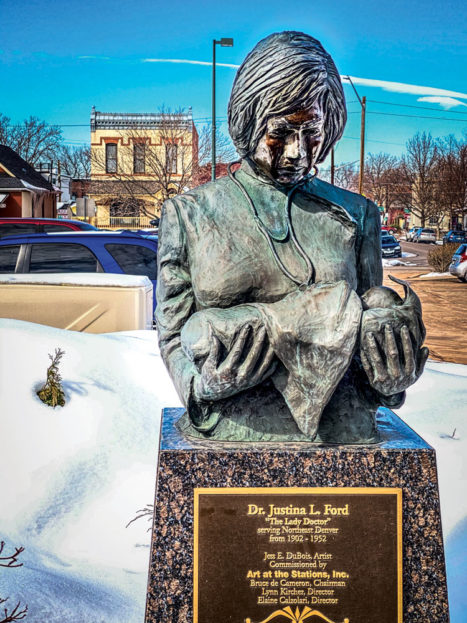
A statue of Ford in Five Points Park n Ride. Her home, now the Black American West Museum and Heritage Center is visible over her shoulder.
Dr. Ford defied the twentieth century’s considerable racial and gender constraints. Since hospitals refused her medical privileges, she practiced medicine on the first floor of her Five Points home and made house calls to those who needed her. Her home on Arapahoe St. was in the heart of Denver’s African American and immigrant communities, and she served everybody. Denver’s African-American weekly, The Denver Star, reported in 1913: “Her large practice enables her to come closely in contact with live social conditions of many patients of the Latin and Japanese races. She enjoys the highest respect of the medical fraternity and has been honored more than once.”
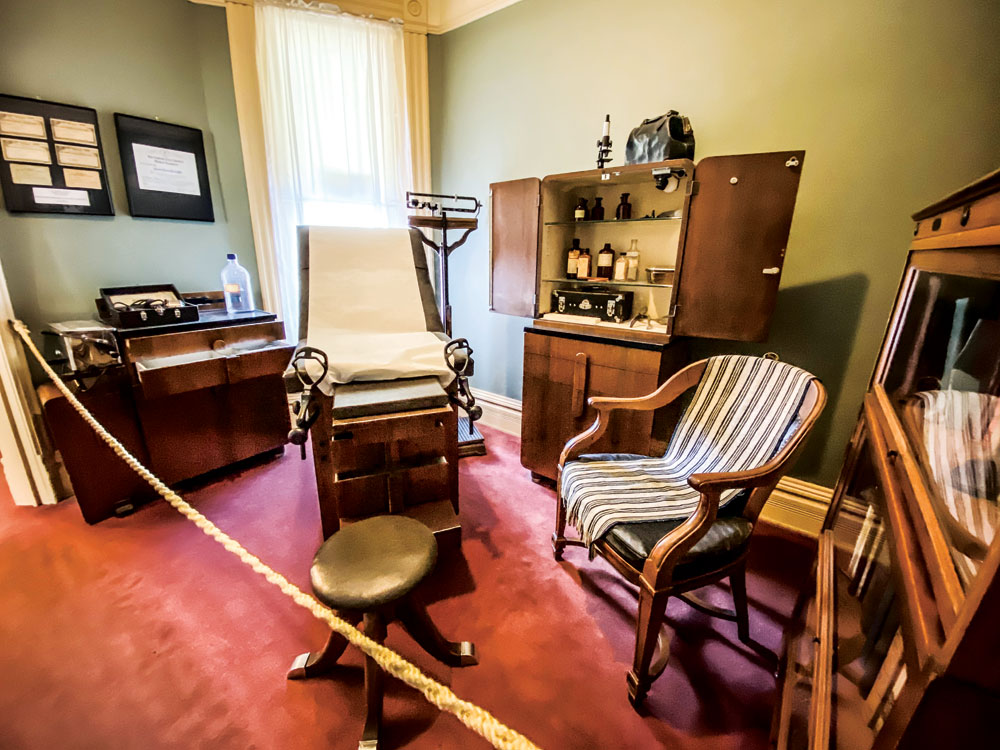
Dr. Ford saw patients in her home medical office, now the Black American West Heritage Museum and Heritage Center. This recreated view of her office includes items from that time period and some that were hers.
Toward the end of her career, in 1949, Ford appealed again to the Colorado Medical Society for admission to its ranks, stating in a letter: “I do general practice work among all classes and races—many are in the low-income group—I do a lot of OB work [and] have delivered around 7,000 babies in the State of Colo. It has required patience and fortitude to endure as I have from 1902 to 1949.”
“There were 37 different nationalities in Five Points at that time,” says Lambe. “When I speak to Ford babies, they all talk about her kindness and generosity. They talk about how people were so poor that they would pay her in vegetables and fruit…and she actually was so inundated with those she ended up given those away, too.”
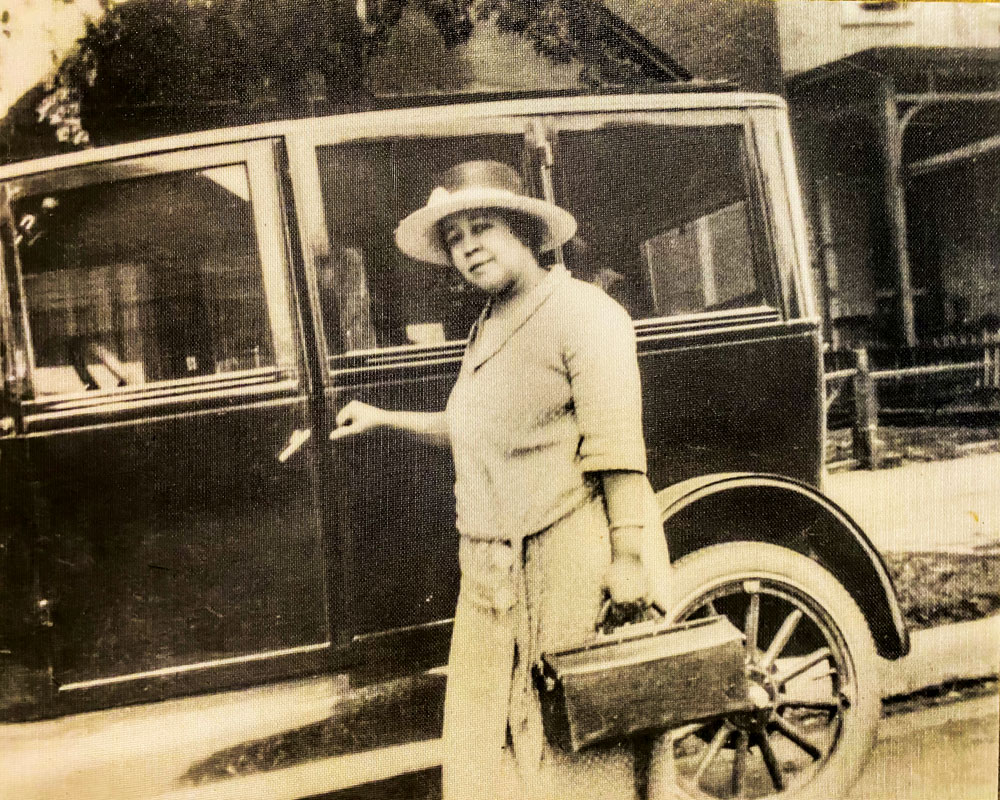
Dr. Ford made many house calls in addition to seeing patients in her home office. Original photo in the Black American West Museum and Heritage Center.
“When all the fears, hate, and even some death is over, we will really be brothers as God intended us to be in this land. This I believe. For this I have worked all my life,” Ford said a few months before her death according to the U.S. National Library of Medicine.
Ford’s home was saved from demolition by a coalition of community leaders and historic preservationists and became home to the Black American West Museum and Heritage Center in 1988. In fall 2019 the museum received national recognition and a $150,000 historic preservation award from National Geographic and Partners in Preservation as part of an annual competition sponsored by the National Trust for Historic Preservation and American Express. The resulting media attention brought more people to the museum, which showcases the rich and varied contributions of African Americans to Colorado and the West. The museum includes items from Dr. Ford’s practice as well as artifacts from buffalo soldiers, cowboys, and even a Civil War uniform from a Black volunteer unit. The museum is an all-volunteer organization, and welcomes new volunteers.
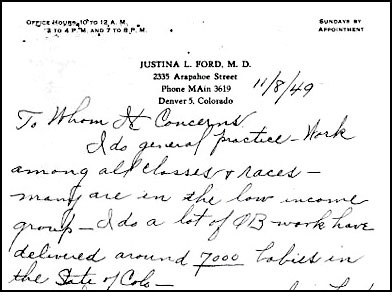
Professional organizations denied Ford admission for most of her career, meaning that she did not have hospital privileges; here, a portion of her 1949 letter appealing for membership to the Colorado Medical Society.
If you are a “Ford baby,” please reach out to Syliva Lambe at sylvia@lambepr.com or call 720-276-3880 to learn more about her oral history project. To learn more about Dr. Justina Ford, visit the museum at 3091 California St. Call the museum at 720-242-7428 for hours, special events, walking tours, to volunteer, and more. View the Colorado Experience episode dedicated to Dr. Ford, here: https://video.rmpbs.org/video/colorado-experience-justina-ford-md/
Historic images are from the Black American West Museum and are used with their permission.



0 Comments